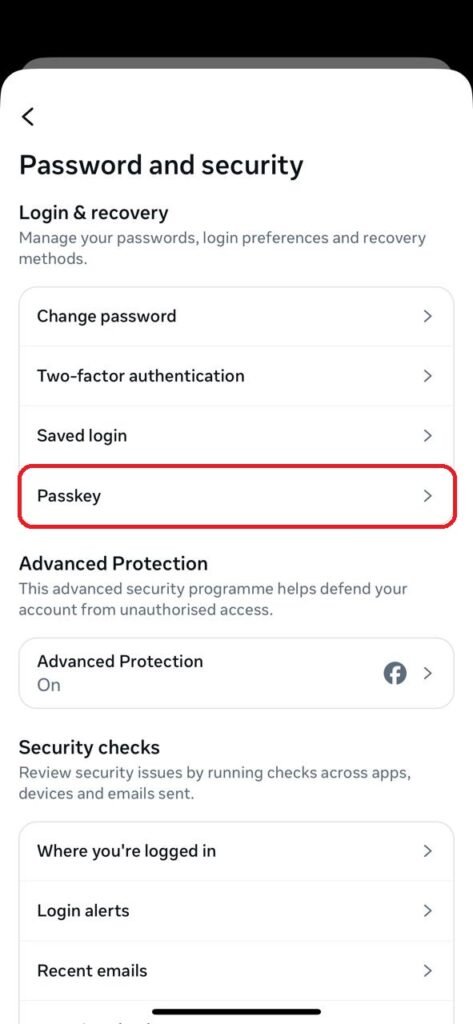The wait is finally over. After a long time seeing competitors embrace modern authentication methods, Meta has finally announced that passkeys will come to both Facebook and Messenger on mobile devices. This is a major security update and represents a big leap forward for the social media company, giving users a safer and easier way to access their accounts.
Table of Contents
What Are Passkeys and Why They Matter
Passkeys are the future of digital authentication. Whereas passwords can be forgotten, stolen, or hacked, passkeys utilize pre-existing security components already built into your smartphone, such as logging into your Facebook account using your fingerprint, face scan or PIN code (essentially the same ways that you unlock your device any other day).
This kind of technology makes passkeys very secure. Unlike passwords which travel over the internet and can be intercepted, authenticating with a passkey is actually a unique digital signature created for each login attempt, generated on your device and cannot be replicated or stolen by cybercriminals.
Facebook’s Long-Awaited Security Upgrade
On Wednesday, the social network announced that both iOS and Android will support passkeys, which will reassure security-minded users who have been waiting for Meta to catch up with the rest of the industry.
The rollout will be in phases. Users on both iOS and Android will see passkey options appear in Facebook security settings soon. Messenger users will have to wait, however. Meta stated it will roll out passkeys for the messaging platform over the next few months.
One of the most convenient aspects of this update is that there will be one passkey for both Facebook and Messenger, so users will not need to set up different authentication methods for different Meta services.
How Passkeys Improve Your Security
Traditional passwords have several vulnerabilities that make them risky:
- They can be guessed or cracked using an automated tool
- Users often use the same password on multiple accounts
- Passwords can be compromised through hacked databases
- Since they are a type of shared secret, passwords are vulnerable to phishing.
Passkeys eliminate the issue of a shared secret. When you sign in using a passkey, your device generates a new, unique pair of cryptographic keys. The private key resides securely on your device, while the public key is shared with the authentication service (such as Facebook). As the private key never leaves the device, it cannot be accessed by cybercriminals, even remotely.
Setting Up Your Facebook Passkey
When this feature is available on a device, setting up a passkey will be easy, and users will be able to log into their accounts quickly and securely. Users will navigate to their Facebook security settings and enable passkey authentication in addition to their other login methods.
The setup process will generally involve:

- Go to your Facebook security settings (Password & Security )
- Select the passkey option
- Verify your identity using your existing authentication method
- Verify the creation of a passkey using the biometric security provided by your device
After the setup process, logging into Facebook will be as simple as opening the app and using your fingerprint or facial scan. Your login credentials will take less than ten seconds to authenticate, with no typing.
Meta Tries to Catch Up in the Passkey Game
Facebook’s move to support passkeys puts the company in line with industry leaders who adopted this technology years ago. Google has provided passkey support for many years within its services, and this is the first major update from X, formerly Twitter, since it added “passkeys” in 2024. While companies like Microsoft, Amazon, eBay, and PayPal have also implemented passkeys, it could be considered fascinating that passkey logins were just implemented within Meta’s own WhatsApp platform.
Even more interestingly, Instagram has remained the only primary Meta platform without support for passkeys, until further notice.
The Future of Password-Free Authentication
Facebook adding passkeys is a significant step towards eliminating passwords altogether. As more apps and websites adopt this method, users will be able to:
- Log in more quickly and easily
- Be better protected from hackers by using passkeys instead of traditional passwords, reducing the risk of compromised accounts and making your login safer learn more
- No longer worry about forgetting passwords
- Have a better defense against cyberattacks
This change is timely. Hackers are getting smarter and old-style passwords are becoming even more insecure, which is pushing more companies to move away from passwords to protect their users.
What This Means for Facebook Users
For the billions of users on Facebook around the world, passkey support is a solid boost for security and convenience. This feature will be particularly useful for users who continually switch between devices or are logging into their accounts on the road.
While Facebook says the rollout is just starting and to passkey support for Facebook App will be built into Messenger’s rollout later, users should start thinking about passing into passkeys as soon as it is options in the settings. Regular password login will remain available, but the security aspect of passkey authentication is worth it.
It’s good to see Meta finally implementing passkey support, a sign that Meta is thinking about security, even if it took longer than the expected time.
As it rolls out and related announcements are made, you can expect Facebook and Messenger will be a safe and convenient social media experience for users.
Meta is also working on other new features. The company is testing a spoiler-hiding tool for Threads. This feature will help users avoid seeing spoilers about movies and TV shows they haven’t watched yet.
